The Affair Read online
Page 24
The Alexandria set loomed on the horizon. Beyond that, she thought she could see a figure in the water, moving towards the jetty. She walked faster. It was a man and he was carrying a bright red object. Something must have fallen in the water and he was retrieving it. He climbed the steps onto the quayside, and it was only as he laid the object on the ground that Diana realised it was a person. Another man appeared and they both leant over it. She broke into a run.
‘Cosa è successo? Sta bene?’ she shouted as she reached the edge of the set.
‘E’ annegata una ragazza,’ one of them men called. A girl had drowned.
‘Are you sure?’ She saw that it was a blonde girl, wearing a red dress, and that she was very thin. The legs were splayed out like those of a fawn. Suddenly it struck her that there was something familiar about those legs.
When Diana reached the spot, her knees gave way. Beneath the mass of matted blonde hair was Helen’s face, streaked with black makeup. Diana screamed, an animal sound forced from deep within her, then pushed the man out of the way and began to administer mouth-to-mouth and compress Helen’s chest. She had learned how to do it on a first-aid course in the Girl Guides – two breaths, four chest compressions – but the last time she tried it had been after her father had a heart attack right in front of her and it hadn’t worked then.
‘You know her?’ one of the men asked.
Diana gasped between chest compressions: ‘It’s Helen. My friend. Get help!’ She noticed that the first man was dressed in a soldier’s camouflage trousers and jacket, and the other looked like a security guard. ‘Quick!’ she yelled, wondering at his lack of urgency.
‘It’s too late,’ the guard said in English. ‘She is dead.’
‘No!’ Diana screamed. ‘She can’t be. Please call an ambulance. Chiami un’ambulanza.’ She pointed to the gatehouse. What was their problem?
The guard got up and sprinted in that direction. Diana continued, and in her head raced the words: I have to save her, I have to. She’s too young to die.
‘Come on, Helen,’ she urged during the chest compressions. ‘Come on, try at least.’ She gulped air and breathed it into Helen’s mouth, holding her nose. The chest rose and fell with her breaths but there was no sign of a pulse, no sign of the heart restarting.
Tears began to roll down Diana’s cheeks but still she kept going. Helen, come back. You can do it. Please. For me.
She remembered stories from the newspapers of doctors restarting someone’s heart after they’d been dead for twenty minutes. She had heard that being in cold water made the metabolism slow down. All sorts of miraculous recoveries came to her as she kept up the rhythm of two breaths, four compressions, two breaths, four compressions. But Helen’s skin felt cold as stone. Diana tried to feel a pulse in her neck, but there was nothing. She lifted her arm, expecting it to be floppy but there was a stiffness. The elbow wouldn’t bend. The guard’s words – ‘She’s dead’ – came back to her. How long had Helen been in the water?
‘I was just over there,’ she whispered. ‘Why didn’t you come and find me? Why?’
She lifted Helen’s head and cradled her, rocking her back and forwards and speaking to her softly. ‘I’m sorry, I’m so sorry. You’re safe. I’ve got you now.’ She felt like a mother holding her daughter. Nothing more must harm her. She’d failed to save her life so all she could do now was protect her body from further damage.
The security guard returned and told her the police were on their way. He was looking at her oddly so she explained: ‘She’s my friend. She was my best friend here in Italy.’
The soldier took out a cigarette, offering one to the security guard but he shook his head. Diana felt it was wrong to smoke with Helen lying there and opened her mouth to say so but the words wouldn’t come out. They’re so casual about it. How can they be so indifferent to a young girl’s death? She bent to kiss the white marble forehead and again she begged her, ‘Please forgive me. I’m sorry, I’m so sorry.’
When the ambulance got there, Diana didn’t want to let Helen go. She asked if she could accompany her – it seemed wrong to leave her on her own – but the policeman said they wanted to take statements from all of them. There were procedures to be followed. She argued, but they wouldn’t budge.
The ambulanceman who lifted Helen onto a stretcher seemed surprised at how little she weighed. There was hardly anything of her. Diana walked alongside as she was carried back towards the ambulance, which was parked just inside the gates. She tried to read the expression on Helen’s face. Had she been scared when she died? Upset about something? The look was blank and unseeing, offering no clues. Helen simply wasn’t there any more.
Diana gave her friend’s hand one final squeeze before she was lifted into the ambulance and the doors closed. As it drove away she began to shiver. There was a rushing sound in her ears and in a separate part of her mind she realised she must be in shock. What happened now? What should she do? She should telephone someone to tell them – but who?
A man she’d never met handed her a cup of sweet scalding coffee and she sipped a little, burning the roof of her mouth. Someone else brought a towel and she realised she was soaking wet from cradling Helen. The soldier was also wrapped in a towel. She sat down on the steps of the Serapeum, the most magnificent building of the third century BC, and a police officer came over to talk to her.
First they asked who Helen was and how they knew each other, and she explained. Then they asked why she was at Torre Astura and she told them it was her job to check the set but that she had no idea why Helen had been there or when she had arrived. She hadn’t seen her there – not until that morning, when it was too late. She gave the telephone number of the production office at Cinecittà, because someone would have to phone England and tell Helen’s parents. Fresh tears welled at that thought. Who would be responsible for delivering the worst news any parent could ever receive?
Then the policeman asked if Helen had any enemies. It was such an absurd question that Diana laughed in disbelief, a strange kind of laugh that came out as more of a snort. ‘God, no. She was an angel.’
Why were they asking that? Did they think someone had been involved in her death? Ernesto’s name popped into her mind but she dismissed it instantly. He could have no possible reason to kill Helen. That was silly. ‘She had no enemies,’ she said out loud, then repeated it in Italian for emphasis.
‘The soldier tells me that you kept saying you were sorry. What were you sorry for, Mrs Bailey?’
Diana explained about their argument two days earlier. She said that Helen had wanted to go out with a man she had had an affair with and she hadn’t liked the idea because he had a wife and children. The policeman peered closely at her before writing that down, and she felt ashamed. It sounded immoral and not like her at all. He asked the name of the man and she gave it. Ernesto would be annoyed.
Diana was shivering hard now, although she could feel the sun was already hot. It was a curious sensation, as though she was separate from the physical world.
‘Perhaps you should go and lie down for a while,’ the policeman suggested. ‘But stay here. Don’t go back to Rome until we give you permission. We will need to speak to you later.’
Diana got up and started to walk back towards the pensione, her legs feeling as though they didn’t belong to her. There was a buzzing noise in her head and she felt as though everything was very far away. Nothing was real. Had it definitely been Helen? Could she have made a mistake?
But she knew she hadn’t. Helen was dead. The policeman was right; she should lie down somewhere until the world stopped feeling so very far away.
Chapter Forty-Seven
Diana lay on her bed staring up at the cracks in the ceiling. Out in the corridor she could hear other lodgers using the bathroom, one after another. The sound of water gushing through the antiquated plumbing was like a waterfall pounding onto a tin roof. How could Helen be dead? How was it possible? She was too young for death. She
couldn’t even begin to guess what had happened.
The house fell silent as the workmen headed off to their jobs on the set. She remembered she had meant to talk to the chief carpenter but couldn’t for the life of her think what she had meant to say.
Her left eye started twitching and wouldn’t stop and that made her realise that she hadn’t cried properly yet. Tears trickled out unbidden but that was all. When would the crying start? There would be crying, that was certain, but she couldn’t cry yet because she had to decide what to do. She should telephone people to tell them – but who?
Hilary. Suddenly she yearned to speak to sensible, practical Hilary. The security guard must have a telephone. Maybe he would let her use it if she went over there.
She sat up. The shivering had stopped but she was still in her damp clothing and it was making the bed damp beneath her. She’d brought another dress with her but it had a bright summery pattern of tiny sprigs of orange blossom on a pale green background and didn’t seem appropriate. She hesitated for a long time, wondering if there was anywhere to buy a black outfit nearby, before realising that it didn’t matter in the slightest what she wore. Helen was gone and nothing could bring her back.
It was a different security guard and he gave her an odd look, but immediately agreed that she could come in and use the telephone. Her hands were shaking hard so he dialled the number for her then passed over the receiver.
Candy answered the phone.
‘Can I speak to Hilary?’ Diana asked, her voice cracking.
There was a pause and a murmur of voices, then Hilary’s voice came on the line. ‘Is that you, Diana?’
Diana opened her mouth to speak but no words came out. Instead the tears came and she couldn’t stop them. ‘It’s Helen …’ she gasped between sobs.
‘I know. The police rang us. God, it’s simply awful. Walter wants me to ring her parents because he thinks it’s a woman’s job but I haven’t a clue what to say. Oh Diana, you poor thing, do try to stop crying.’
Diana’s chest hurt with the force of her sobs and she struggled to speak. The security guard passed her a handkerchief and she blew her nose hard. ‘I t-tried for ages to save her but it was t-too late. She was g-gone.’
There was a tutting sound down the line. ‘You shouldn’t be there on your own. I’m sending a taxi to bring you back to Rome. If I hire a local firm they should be with you in the next half hour.’ Hilary sounded calm and in control. ‘Come straight to Cinecittà,’ she said. ‘You need to be among friends.’
‘B-but the police told me to stay here.’
‘That’s ridiculous. I’ll get our lawyers to speak to them. Go back to the pensione, pack your things and wait for the taxi. You’ll be here in a couple of hours and we’ll talk properly then.’
‘OK,’ Diana agreed. It was good to have a plan. She handed the phone back to the guard and offered to return his handkerchief as well, but he motioned that she should keep it.
The taxi arrived promptly and Diana calmed down a little on the drive back to Rome. She wondered what everyone on the set would make of it. Hilary hadn’t known Helen personally; neither had Candy. They didn’t know how deflated she had been recently and they certainly didn’t know about her flirtation with Ernesto, so they were unlikely to be able to shed any light on what had happened. But perhaps they would be able to explain why Helen had been there at all. Had she been sent on some errand – perhaps to check the makeup stocks at Torre Astura? It seemed unlikely. Anyone could have done that.
Hilary was waiting in the office when Diana arrived. She sent Candy out to pay the taxi driver before pulling Diana towards her for a warm hug.
‘What a hideous experience! She was a good friend of yours, wasn’t she?’ She patted Diana’s shoulder. ‘Sit down and tell me all about it while I make some tea.’
‘There’s hardly anything to tell,’ Diana shook her head, holding back the tears. ‘I woke this morning to hear a soldier shouting for help and when I ran down to the set, he’d pulled Helen out of the water and she was dead. I tried to revive her but … but it was useless.’ She sat at her desk and gazed blankly at the familiar filing tray and telephone.
Hilary plugged in the kettle. ‘Didn’t she find you last night? She told the girls in the makeup department she was going to look for you. Said she had to speak to you urgently.’
‘Really?’ Diana felt a plummeting sensation in her stomach. She buried her face in her hands and groaned. ‘We’d argued. She must have wanted to make things up.’ Hilary looked at her quizzically. ‘We fell out the night before last, about Ernesto. Immediately after our affair ended, he seduced Helen and she was keen on him, even when I told her about his wife. I yelled at her, and I shouldn’t have. I feel simply awful about it now.’
Hilary sat down to wait for the kettle. ‘So you didn’t see her? That’s odd. The policeman who rang gave us the impression you were with her when she died. They must have got it wrong.’
‘No, they’re confused. I didn’t know anything about it till this morning. I suppose she was alone.’
Hilary pursed her lips. ‘Do you think she committed suicide?’
The thought hadn’t occurred to Diana, and she was shocked that Hilary could consider it. A young woman would have to be utterly hopeless to take such a drastic step. She ran through possible reasons for suicide but couldn’t come up with any. Even if Helen had been pregnant, there were things that could be done. She’d heard that it was relatively simple in London to find a midwife who would terminate an unwanted pregnancy, though, admittedly, in the Pope’s hometown it was likely to be much harder. But if Helen were pregnant, whose could it be? Surely not Ernesto’s?
Diana realised she hadn’t yet answered Hilary’s question. ‘No, it doesn’t add up. Why would she come all that way to see me then kill herself before finding me? … Unless she was very drunk. Sometimes she drank more than was good for her.’ Diana felt disloyal saying that when Helen wasn’t around to defend herself, and wished she could take back the words.
‘Did you mention that to the police?’
Diana shook her head. ‘To be honest, I can’t remember what I said to the police. I was so distraught this morning I could barely speak. I’m going to have to talk to them again, no doubt.’
Candy came back into the office. ‘Did you tell Diana about Helen’s mom?’ she asked. Hilary gave her a warning frown.
‘Have you talked to her? Oh God, how did she take it?’
Candy answered. ‘She didn’t believe it at first, and then she screamed so loud I could hear her on the other side of the office. I suppose her folks’ll come out here, don’t you think? I wonder where they’ll have the funeral? The whole cast and crew should go. That’s what I’d want if it was me: lots of flowers and some great music.’
Diana was uncomfortable with the way Candy was treating it, almost as another piece of gossip on the set. She didn’t feel like discussing it with her. Hilary brought over her cup of tea.
‘I think I’ll type up my notes from the trip,’ Diana told them. ‘I need to keep myself busy and I don’t know what else to do.’
‘Are you sure?’ Hilary frowned again. ‘You look very pale and shaky. Have you eaten anything today?’
Diana remembered that she hadn’t eaten since lunchtime the day before.
‘Let me take you to the bar,’ Hilary said firmly in her head-girl voice. ‘We’ll get some food inside you then send you home to bed. Drink your tea first.’
Diana looked at the phone. It would be good to call Trevor. He’d met Helen and would sympathise with the shock she was feeling. But he would ask questions about why Helen had come to Torre Astura, and Diana couldn’t tell him about their argument because then she would have to confess about Ernesto. It was a tangled mess.
She couldn’t think straight for herself, so she obeyed Hilary’s orders, drinking her tea then following her to the bar. It was after three and they were no longer serving sandwiches but they made one up for her with f
resh tomatoes. She chewed mechanically without tasting it.
‘Take the weekend off,’ Hilary suggested. ‘Get lots of rest and eat regular meals. Don’t come back to work till Monday morning. We’re only shooting a few fill-in scenes, nothing vital.’
I don’t want to be on my own for two days. What will I do with myself? Diana was about to protest, then realised that she was really very tired. Perhaps she could just sleep.
After the food, Hilary ushered her into a studio car and sent her back to Pensione Splendid. Diana unlocked the door and went to sit at the window and gaze out across the rooftops, trying to think clearly.
If only she had gone back to resolve the argument with Helen the same afternoon. If only she had gone into the café where she saw her with Luigi. She still couldn’t imagine what had happened but it was becoming clear that if she had made peace with her Helen would be alive today – and that was a hefty burden to bear.
Chapter Forty-Eight
Next morning, Diana was wakened by loud knocking. She pulled on a robe and opened the door to see two policemen standing there, with her padrona behind them.
‘Mrs Bailey, you were supposed to stay in Torre Astura. We need to ask you some questions,’ one said in English.
Diana folded her arms protectively across her chest. ‘Yes, of course. If you’ll just let me get dressed.’ She nodded to the padrona, who didn’t seem best pleased at this visitation.
‘Meet us downstairs and we’ll drive you to the station. Bring your papers.’
As she dressed, Diana shook herself mentally. She had to give the police all the information she could to help them find out what happened to Helen. It was imperative that they solved the mystery or her family and friends would be left hanging on, wondering. She still didn’t know what she thought herself but the police were better at this kind of thing. If she gave them the information, they’d work it out. She felt a frisson of nerves, but quelled them. She was an intelligent woman with a PhD from Oxford. She could handle this.

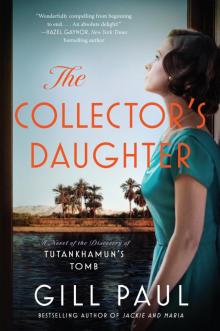 The Collector's Daughter
The Collector's Daughter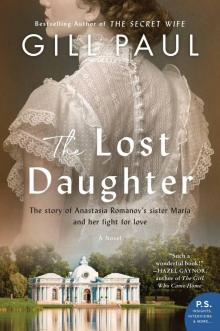 The Lost Daughter
The Lost Daughter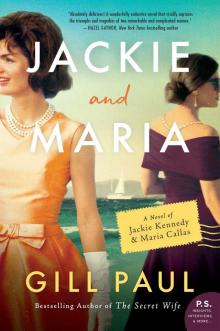 Jackie and Maria
Jackie and Maria The Affair
The Affair Love...Maybe
Love...Maybe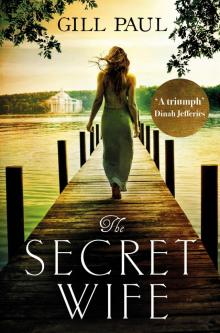 The Secret Wife
The Secret Wife No Place For a Lady
No Place For a Lady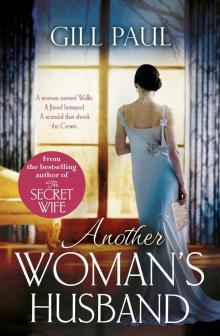 Another Woman’s Husband
Another Woman’s Husband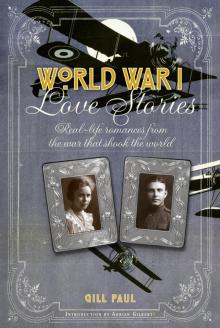 World War I Love Stories
World War I Love Stories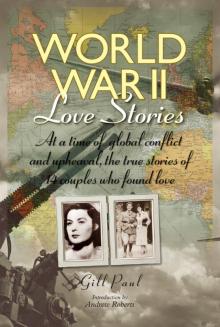 World War II Love Stories
World War II Love Stories